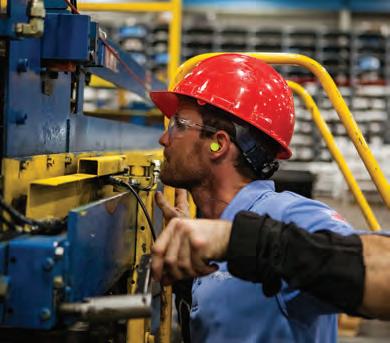






















IWP is a statewide association representing the 22 local workforce areas across the state of Illinois. Our partnerships spread across 10 Economic Development Regions, working with chief elected officials in every city and county to develop a local workforce to support each area’s local economy.





Serve as the voice of the public workforce development system
Share information among stakeholders and formulate policy positions
Provide professional development to local workforce boards and program staff
Provide suggestions/recommendations for state guidelines and procedures
Champion initiatives that will continue to hone a skilled workforce throughout the State of Illinois
IWP is committed to creating a skilled workforce for employers to ensure that our state remains competitive and continues to grow.
Utilizing the Workforce Innovation and Opportunity Act (WIOA) funds, local workforce services are able to serve community members, especially people with barriers to employment as well as assist employers with their recruitment and retention needs.

The Workforce Innovation and Opportunity Act (WIOA) is the federal legislation and administered by the United States Department of Labor (USDOL) to support state workforce systems and programs.
In Illinois, the funding is made available through the Illinois Department of Commerce and Economic Opportunity (DCEO) and allocated to Local Workforce Areas (LWIA) to support each local workforce system.
In FY 24, for the first time, the Illinois General Assembly funded the local Workforce System. This funding provided an opportunity to support projects and programs not eligible for federal funding or due to reduced federal funding provided an opportunity to expand programs.
Career Exploration
Host 8th grade career exploration events for over 700 students, including field trips to the trade schools and local manufacturing companies.
Utilizing Technology
Purchased computers and job search materials for the homeless shelters and two community based organizations that work with individuals challenged with substance abuse and domestic violence situations.
Focused on Mental Health
Hosted a Rural Mental Health Conference, providing information and resources to participants from the business, education and service provider sectors.
Obtaining Certifications
Provided customer service training in a partnership with the National Restaurant Association. The four-hour Gold Star Guest Service Training led to a certificate from the NRA; two staff were trained as trainers to deliver the local training, over 400 books and exams were purchased, 25 high school students and 176 adults trained;
Expanding Our Reach
15 outreach kiosks were placed throughout one county in libraries, food banks, and other high traffic locations with information on the programs and services available, including the on-line job board.
Tapping into the Hidden Workforce
Provided paid work experience and job placement services to justice impacted individuals through multiple programs throughout the State.






Local Workforce Boards are responsible for the strategic development of the local workforce system by looking at current trends and forecasting future needs, while offering nimble and flexible programs and services. Led by local employers, working with chief local elected official, economic development agencies, educational providers, labor organizations and other community stakeholders, local workforce boards are responsive to the unique needs of their local economy.
Customer centered design allows local communities to coordinate services and maximize resources to increase access to employment opportunities for all people. Illinois has 31 American Job Centers (AJC), one in each LWIA, as well as additional affiliate and sector centers throughout the State.
• The design is focused on one-stop services, whether a physical location or virtual on-line resources.
• The success of the local system relies on the implementation of service integration and collaboration among all partners.

Find your local workforce area below to connect to services and resources to help you reach your training and employment goals.




